University News
New Centennial Honors College Course at Western Illinois University Gives Students an Insight into WIU's Legacies and Traditions
November 3, 2016
MACOMB, IL - - It's not very often that college students take a history class where they are part of the story. However, that's what students in Western Illinois University's new Centennial Honors College course get to do. Western's Legacy: The History of Western Illinois University (GH299) was introduced at the start of the Fall 2016 semester.
Academic excellence, educational opportunity, personal growth and social responsibility: These four core values that Western touts were not just something pulled out of thin air one day. These are the values that Western Illinois University was founded on in 1902. Students in the new Honors course will spend the semester learning how these values affected the creation of WIU, first called the Western Illinois State Normal School.
How the course was formed
The course evolved from an idea from senior economics major William Gradle (St. Charles, IL), political science alumnus and 2015 political science alumnus and current WIU graduate student Jacob Tomlinson (Rockford, IL) and senior recreation, park and tourism administration major Robby Barlow (Nauvoo, IL). They were meeting with Vice President for Advancement and Public Services Brad Bainter when the group discussion turned to Leatherneck traditions and the relevance and importance of those to current students.
"Initially, we thought it would be relevant to the First Year Experience program and could be taught during University 100," Gradle said. "However, after some research, we realized that University 100 covers a lot of material already and wouldn't be able to fit it in.
"During a University Honors Council meeting, I realized that an Honors course would be the perfect platform for the history and legacy of WIU," he added
Gradle took his idea to Rick Hardy, director of WIU's Centennial Honors College, and Molly Homer, academic advisor in the Honors College.
"I initially brought the idea up to Dr. Hardy and Dr. Homer, given that I would need their approval to proceed. Not only did the idea receive approval, it also received overwhelming support from the Honors College," Gradle said.
Hardy knew he was going to need someone knowledgeable to teach this course. Who better than someone who has written written several articles and books about Western, including "Western Illinois Heritage" and "First Century: A Pictorial History of Western Illinois University," WIU Distinguished Professor Emeritus John Hallwas.
"When Wil first broached the idea of creating an Honors course about Western's heritage, I immediately thought of Professor John Hallwas," said Hardy. "He is, after all, Western's laureate. His extensive research and prolific publications about Western Illinois University make him the ideal person to teach such a course."
Hallwas not only agreed to teach the new Honors course, he offered to do so at no cost to the University. WIU History Professor Greg Hall is co-teaching alongside Hallwas.
Hallwas and Hardy developed a description of the course to be circulated for approval.
"WIU students who aren't from the west central Illinois region may have a hard time identifying with the greater McDonough County community," explained Gradle. "This course provides, in a sincere and authentic way, the opportunity to identify with this place that hundreds of thousands of people have called home over the last 117 years. It has the potential to ignite and revitalize the WIU identity."
Hardy explained that the Honors College is constantly looking for new and exciting courses to stimulate and challenge the best and brightest students. While all new courses must go through the approval process, this is the first Honors College course initiated by a student-member of the Honors Council.
"The Honors College is also grateful to Professor Greg Hall for his significant role in guiding students through their individual research projects. And we appreciate the invaluable assistance of University Archivist Kathy Nichols; she is a treasure trove of knowledge, and loves helping students locate historical documents," Hardy added.
What do you need this teacher training school for anyway?
The course is taking a chronological approach to studying the history of Western Illinois University, beginning with how and why the teacher training school—originally known as Western Illinois State Normal School—was formed. Hallwas and Hall will delve into what was happening in 1902 to create a need for the school in the western Illinois region, as well as the forces that came together to determine why Macomb was chosen as a location and the development of programs. They will move through the decades as the semester progresses and continue into how Western became a university and discuss how the lives of students have changed over the years.
"In the beginning, we didn't even have majors," said Hallwas. "The point of the school was to turn out grade school teachers. Then, after awhile, we developed majors so teachers could have specialties.
"We also predominately had women students in the early years; as we discuss why that was, it will give us a chance to discuss a change for women in general during those times. We will get into a lot of significant issues," Hallwas added.
"Some institutional histories can be as dry as dust," said Nichols. "But Western's is sure not dry when you see it in its context. Dr. Hallwas sees everything in its context … literature … human life … he does an excellent job explaining how the context relates to Western's history."
Students won't just be learning in the classroom. Hallwas and Hall have been taking the students to various places on campus for history lessons, as well. Recently, the students toured Sherman Hall, the first building of the Illinois Normal School, and a building on the National Register of Historic Places. Their tour included a visit with President Jack Thomas in his office.
The students will also visit the University Archives, housed in the Leslie F. Malpass Library. Nichols will be available throughout the semester to assist them with their research paper, which will be the culmination of the class.
"Usually when you're at a university and you want to do a research paper, you can find some books in the library," explained Hallwas. "We are going to be talking about the history of WIU; this is the greatest place in the world to go. You have everything from hand-written presidential papers, faculty papers and publications to student yearbooks and newspapers. This class will give students a chance to find out what it means to really research something when you have a multitude of kinds of archival materials to work with."
Nichols further explained, "For instance, the students will work with hand-written old documents like President Henninger's papers. They will get the chance to travel back in time and read about when the school hadn't even opened yet, and he was interacting with people to figure out how it was going to go and what arrangements needed to be made. It's a very different way of looking at the situation."
Social responsibility and core values
Hallwas said the students will learn that out of all of the Illinois universities, WIU was the only one established because of a social cause.
"Our core values of academic excellence, educational opportunity, personal growth and social responsibility developed based on how Western was created," said Hallwas. "The normal school was formed as part of a crusade. Illinois had over 10,000 rural schools. McDonough County alone had almost 150. During that time period, every neighborhood had a school, but they had very little money and ill-educated teachers. This was a big issue. Western was formed because of this social need for the rural students who deserved a decent education.
"People were so proud to be here—to be a part of that movement," Hallwas said.
Those four values continue to be Western's guiding light today.
Gradle believes those values have impacted his education in the same way Western impacted the students in the early 1900s.
"Western empowers students to be the best they can be," Gradle said. "Specifically, the most impactful and defining tracts of my collegiate journey have stemmed from the Centennial Honors College, and I credit that directly to those who work there. They challenge the way students see the world."
Posted By: Alisha Looney (AA-Looney@wiu.edu)
Office of University Communications & Marketing

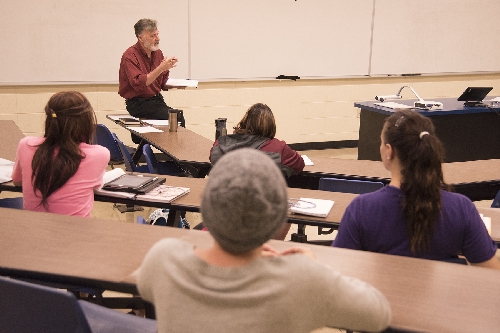
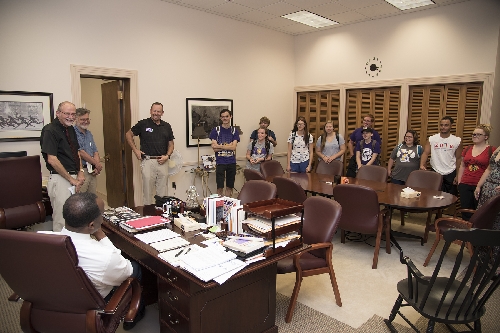
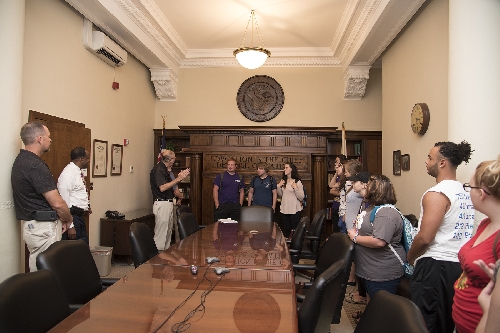
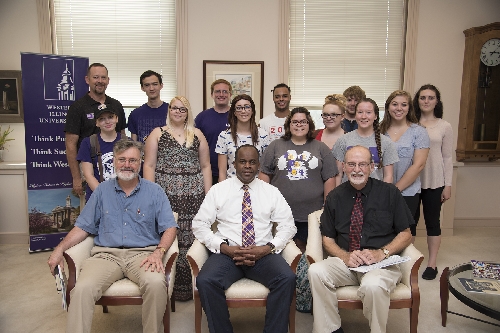
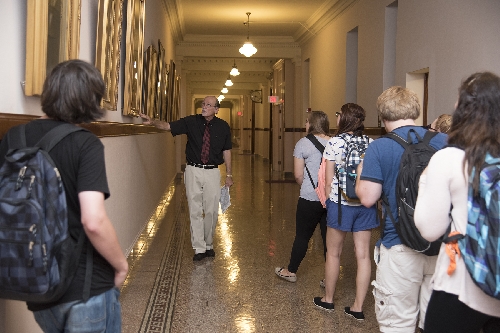
Connect with us: